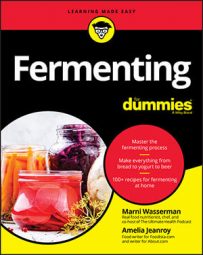Nuts and seeds contain all the energy and nutrients needed to grow a plant in a concentrated form. It's as though they are asleep, waiting for the right conditions to allow them to grow. Sprouting a seed or nut wakes them up, and they begin to release their nutrients and activate their enzymes.
To make delicious sprouts, start with the best quality nuts and seeds you can find. Make sure they are raw, fresh, and organic, if possible. Watch out for nuts or seeds that have been roasted or irradiated — they won't sprout! And avoid any that are discolored, dried, or cracked.
When a nut or seed is soaked, some impressive things start to happen!
Increasing nutrients: Sprouting increases B vitamins (especially B2, B5, and B6) and carotene, and produces vitamin C.
Fighting phytic acid: Nuts and seeds contain something called phytic acid, which blocks the body's ability to absorb certain minerals, like calcium, magnesium iron, copper, and zinc. But the good news is that sprouting neutralizes phytic acid!
Neutralizing enzyme inhibitors: All nuts and seeds contain enzyme inhibitors that keep them in a resting state until they have the right conditions to grow. Unfortunately, enzyme inhibitors interfere with our body's own digestive enzymes. Sprouting to the rescue!
Soaking and sprouting nuts and seeds neutralizes enzyme inhibitors, making these little nuggets of nutritional goodness easier for us to digest. Sprouting also produces enzymes, giving our digestion a little helping hand.
Don't waste your time sprouting walnuts or pecans which have been removed from their shells and therefore will not sprout! Macadamia nuts are just difficult to sprout and may take up to 30 days!
How to sprout seeds and nuts
Sprouting couldn't be easier. The basic technique is the same for every sproutable nut and seed. The only difference is that some nuts and seeds take longer to sprout, so you'll have to be more patient. Here's what you need to do:
Wash, then soak the nuts or seeds in water.
Soaking times vary so refer to the following table.
Drain, rinse, and put them in a jar.
Cover the jar with something that allows for air flow, but will also keep any dirt or bugs out.
A piece of cheesecloth or paper towel secured with a rubber band works nicely.
Sprinkle with water twice a day until they begin to sprout.
You'll know it's working when you see little tails start to grow.
Instead of sprouting in a jar, you can buy a mesh bag designed specifically for sprouting or making nut milk. Or, try sprouting your nuts or seeds in an ordinary kitchen sieve set over a bowl.
Keep the nuts or seeds damp but not wet. You don't want mold to grow.
| Nut or Seed | Soak | Rinse | Sprout |
|---|---|---|---|
| Almond | 8–12 hours | Three times a day | Three days |
| Pumpkin | 8 hours | Three times a day | Three days |
| Sunflower | 2 hours | Twice a day | 12 to 18 hours |
| Sesame | 8 hours | Four times a day | Two to three days |
Chart adapted from Whole Food Raw Now and Nourishing Traditions (Fallon)
Dry or store your sprouts
Once soaked or sprouted, nuts and seeds should be stored in the fridge if they are not going to be used right away in a recipe. They will store for up to one week before they start to lose nutrition or grow mold in the fridge. Otherwise they can be placed in the freezer. You can also dry them in a warm oven or dehydrator, set at about 120 degrees, and test them until they are dry.
Ways to enjoy sprouted nuts and seeds
Sprouted nuts and seeds can be used in many different ways to "liven" up your meals (literally!). Here are some ideas:
Add them to salads or sandwiches.
Use them in a homemade granola or muesli.
Make a super-powered trail mix.
Top off your stir-fry, curry, or other vegetable dish.
Make a flavorful raw nut and seed pâté or filling for a wrap (sprouted, of course).
Get creative with nondairy nut cheese.
Blend or grind them to make a creamy nut butter.
Snack on them.

